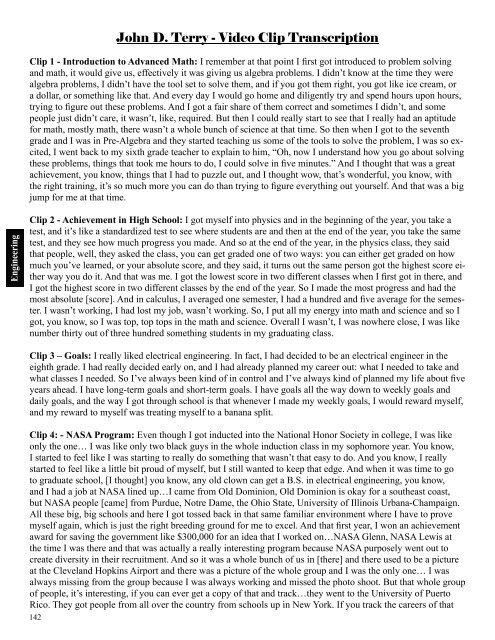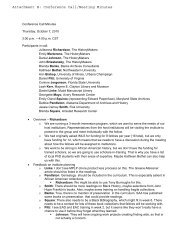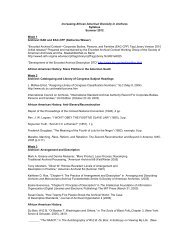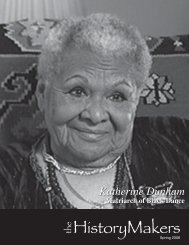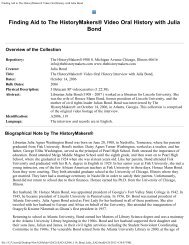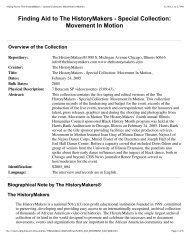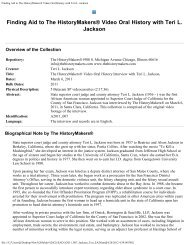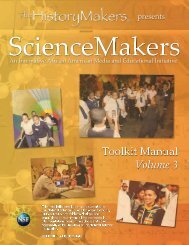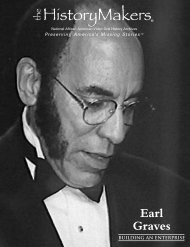ScienceMakers Toolkit Manual - The History Makers
ScienceMakers Toolkit Manual - The History Makers
ScienceMakers Toolkit Manual - The History Makers
Create successful ePaper yourself
Turn your PDF publications into a flip-book with our unique Google optimized e-Paper software.
Engineering<br />
John D. Terry - Video Clip Transcription<br />
Clip 1 - Introduction to Advanced Math: I remember at that point I fi rst got introduced to problem solving<br />
and math, it would give us, effectively it was giving us algebra problems. I didn’t know at the time they were<br />
algebra problems, I didn’t have the tool set to solve them, and if you got them right, you got like ice cream, or<br />
a dollar, or something like that. And every day I would go home and diligently try and spend hours upon hours,<br />
trying to fi gure out these problems. And I got a fair share of them correct and sometimes I didn’t, and some<br />
people just didn’t care, it wasn’t, like, required. But then I could really start to see that I really had an aptitude<br />
for math, mostly math, there wasn’t a whole bunch of science at that time. So then when I got to the seventh<br />
grade and I was in Pre-Algebra and they started teaching us some of the tools to solve the problem, I was so excited,<br />
I went back to my sixth grade teacher to explain to him, “Oh, now I understand how you go about solving<br />
these problems, things that took me hours to do, I could solve in fi ve minutes.” And I thought that was a great<br />
achievement, you know, things that I had to puzzle out, and I thought wow, that’s wonderful, you know, with<br />
the right training, it’s so much more you can do than trying to fi gure everything out yourself. And that was a big<br />
jump for me at that time.<br />
Clip 2 - Achievement in High School: I got myself into physics and in the beginning of the year, you take a<br />
test, and it’s like a standardized test to see where students are and then at the end of the year, you take the same<br />
test, and they see how much progress you made. And so at the end of the year, in the physics class, they said<br />
that people, well, they asked the class, you can get graded one of two ways: you can either get graded on how<br />
much you’ve learned, or your absolute score, and they said, it turns out the same person got the highest score either<br />
way you do it. And that was me. I got the lowest score in two different classes when I fi rst got in there, and<br />
I got the highest score in two different classes by the end of the year. So I made the most progress and had the<br />
most absolute [score]. And in calculus, I averaged one semester, I had a hundred and fi ve average for the semester.<br />
I wasn’t working, I had lost my job, wasn’t working. So, I put all my energy into math and science and so I<br />
got, you know, so I was top, top tops in the math and science. Overall I wasn’t, I was nowhere close, I was like<br />
number thirty out of three hundred something students in my graduating class.<br />
Clip 3 – Goals: I really liked electrical engineering. In fact, I had decided to be an electrical engineer in the<br />
eighth grade. I had really decided early on, and I had already planned my career out: what I needed to take and<br />
what classes I needed. So I’ve always been kind of in control and I’ve always kind of planned my life about fi ve<br />
years ahead. I have long-term goals and short-term goals. I have goals all the way down to weekly goals and<br />
daily goals, and the way I got through school is that whenever I made my weekly goals, I would reward myself,<br />
and my reward to myself was treating myself to a banana split.<br />
Clip 4: - NASA Program: Even though I got inducted into the National Honor Society in college, I was like<br />
only the one… I was like only two black guys in the whole induction class in my sophomore year. You know,<br />
I started to feel like I was starting to really do something that wasn’t that easy to do. And you know, I really<br />
started to feel like a little bit proud of myself, but I still wanted to keep that edge. And when it was time to go<br />
to graduate school, [I thought] you know, any old clown can get a B.S. in electrical engineering, you know,<br />
and I had a job at NASA lined up…I came from Old Dominion, Old Dominion is okay for a southeast coast,<br />
but NASA people [came] from Purdue, Notre Dame, the Ohio State, University of Illinois Urbana-Champaign.<br />
All these big, big schools and here I got tossed back in that same familiar environment where I have to prove<br />
myself again, which is just the right breeding ground for me to excel. And that fi rst year, I won an achievement<br />
award for saving the government like $300,000 for an idea that I worked on…NASA Glenn, NASA Lewis at<br />
the time I was there and that was actually a really interesting program because NASA purposely went out to<br />
create diversity in their recruitment. And so it was a whole bunch of us in [there] and there used to be a picture<br />
at the Cleveland Hopkins Airport and there was a picture of the whole group and I was the only one… I was<br />
always missing from the group because I was always working and missed the photo shoot. But that whole group<br />
of people, it’s interesting, if you can ever get a copy of that and track…they went to the University of Puerto<br />
Rico. <strong>The</strong>y got people from all over the country from schools up in New York. If you track the careers of that<br />
142


